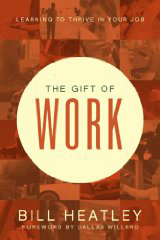The Gift of Work -> Chapter 3: Redefining Success
 My head spins with all the different definitions of success out there. Even if I can think myself through their various fallacies, the measures of success in this culture still haunt and lure and accuse.
My head spins with all the different definitions of success out there. Even if I can think myself through their various fallacies, the measures of success in this culture still haunt and lure and accuse.
 What I need, though, is not another critique of the culture’s twists and perversions of the truth. Nor, on the other hand, do I need another vague, conceptual affirmation of the eternal biblical principles by which my work should find its purpose, motivations and methods.
What I need, though, is not another critique of the culture’s twists and perversions of the truth. Nor, on the other hand, do I need another vague, conceptual affirmation of the eternal biblical principles by which my work should find its purpose, motivations and methods.
So I especially enjoyed Heatley using four work-based categories, (success, competition, loyalty and service) to think through the shortcomings in most workplaces and the alternatives a faith-based perspective would contribute.
While I agree that “love” holds the key to unlocking the creative juices that will eventually result in a plethora of practical alternatives emerging in workplaces around the world, I’m anxious to get on to brainstorming what these practical alternatives might be.
For example, let’s take a variety of workplace processes: hiring, training, firing, planning, meetings, compensation, performance reviews, approval processes, budgeting, adopting new technologies, etc., and having teams work through what those need to look like if we’re to achieve, “market strength, employee focus and customer value.” In other words, put some feet on love in the context of work.
How do you find ways to give practical form to your faith-based values at work, in the context of work’s issues, processes and structures, and within a culture where work is a daily reality on which our survival depends?







March 25th, 2009 at 1:43 pm
I like the idea of incorporating “goodness” into our idea of success. Can this be done institution-wide, though? I’m not very confident that it can. Businesses, after all, are typically built with the explicit goal of earning profit. And, of course, it’s not uncommon for profit to be pursued “by any means legal (or illegal… if you can get away with it).” But as individuals we should strive for goodness in our working lives. If enough individuals in an institution make goodness their goal, the institution as a whole will change.
March 25th, 2009 at 5:16 pm
I think if shareholders and other business owners expanded the purposes of profit beyond lining their own pockets, then profit still has healthy potential as a goal, metric and motivator. (I’m a firm believer that capitalism is goodness’ best bet as far as socio-economic systems go.)
Investing in the long term health of the company, investing in the education, health and infrastructure of the local communities where they do business, and creating new opportunities for business enterprise would be three expanded purposes which are quite consistent with a firm’s profit goal.
March 26th, 2009 at 9:09 am
Today, success drives people not character. We are trained to be successful, to admire successful people, to live up to our potential, to win. The message is clear, there are only two kinds of lives – successful and not worth living. The burden of success weighs heavy on our backs and coulda, shoulda, woulda are “mia culpa’s” of our failure to succeed.
Blind obsession with success pulsates all around us, especially at work, and if we are truthful with ourselves we can see how it has affected our decisions and shaped our character. By redefining success we begin to reshape our life and strongly influence the lives of those around us. We become guides for those who seek a life of value and substance. By infusing humility into our definition of success we bring our life and our pursuits and the molding of our character back under loving hand of God.
The question we must ask ourself is, “Who am I becoming and how does succeeding impact my character?” Does your definition of success lead you to Jesus? If it doesn’t, then lay it down as the rich young ruler should have and follow Jesus and he will teach you the true meaning of success in life and in that part of life we call work.
March 28th, 2009 at 11:08 am
Bill,
I think we’re agreeing that it’s the whole, healthy, integrated, free and responsible human person who is successful.
It’s the difference between accumulating the social markings of success on the outside or cultivating the character-based seeds of success on the inside.
The quality of life that results from each strategy is cause for pause.